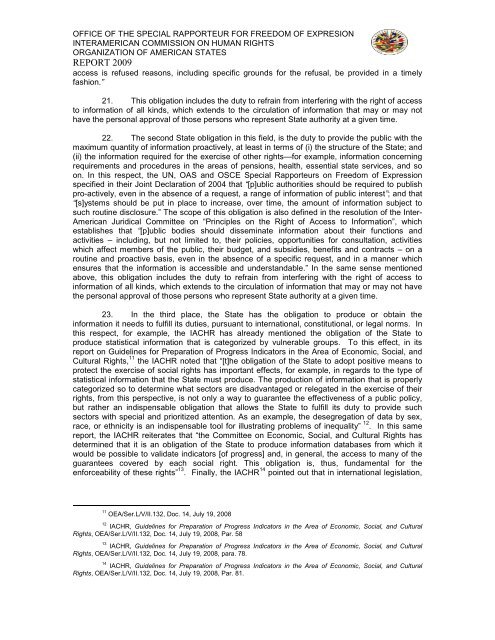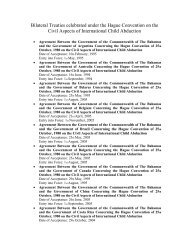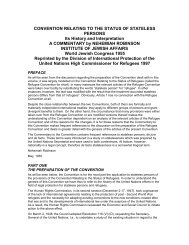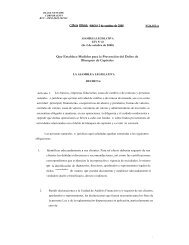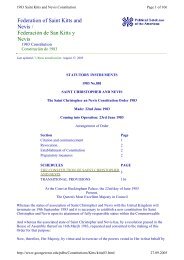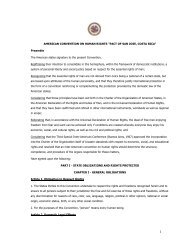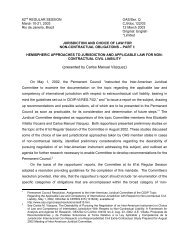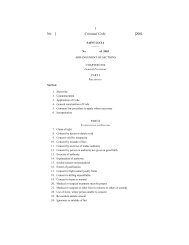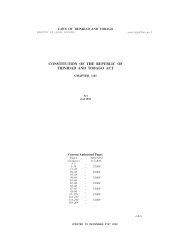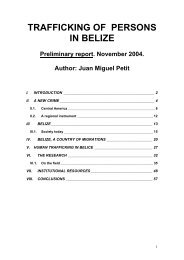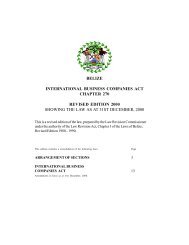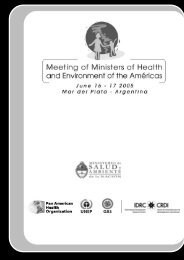The right of access to information Special Rapporteurship for ... - OAS
The right of access to information Special Rapporteurship for ... - OAS
The right of access to information Special Rapporteurship for ... - OAS
Create successful ePaper yourself
Turn your PDF publications into a flip-book with our unique Google optimized e-Paper software.
OFFICE OF THE SPECIAL RAPPORTEUR FOR FREEDOM OF EXPRESION<br />
INTERAMERICAN COMMISSION ON HUMAN RIGHTS<br />
ORGANIZATION OF AMERICAN STATES<br />
REPORT 2009<br />
<strong>access</strong> is refused reasons, including specific grounds <strong>for</strong> the refusal, be provided in a timely<br />
fashion.”<br />
21. This obligation includes the duty <strong>to</strong> refrain from interfering with the <strong>right</strong> <strong>of</strong> <strong>access</strong><br />
<strong>to</strong> <strong>in<strong>for</strong>mation</strong> <strong>of</strong> all kinds, which extends <strong>to</strong> the circulation <strong>of</strong> <strong>in<strong>for</strong>mation</strong> that may or may not<br />
have the personal approval <strong>of</strong> those persons who represent State authority at a given time.<br />
22. <strong>The</strong> second State obligation in this field, is the duty <strong>to</strong> provide the public with the<br />
maximum quantity <strong>of</strong> <strong>in<strong>for</strong>mation</strong> proactively, at least in terms <strong>of</strong> (i) the structure <strong>of</strong> the State; and<br />
(ii) the <strong>in<strong>for</strong>mation</strong> required <strong>for</strong> the exercise <strong>of</strong> other <strong>right</strong>s—<strong>for</strong> example, <strong>in<strong>for</strong>mation</strong> concerning<br />
requirements and procedures in the areas <strong>of</strong> pensions, health, essential state services, and so<br />
on. In this respect, the UN, <strong>OAS</strong> and OSCE <strong>Special</strong> Rapporteurs on Freedom <strong>of</strong> Expression<br />
specified in their Joint Declaration <strong>of</strong> 2004 that “[p]ublic authorities should be required <strong>to</strong> publish<br />
pro-actively, even in the absence <strong>of</strong> a request, a range <strong>of</strong> <strong>in<strong>for</strong>mation</strong> <strong>of</strong> public interest”; and that<br />
“[s]ystems should be put in place <strong>to</strong> increase, over time, the amount <strong>of</strong> <strong>in<strong>for</strong>mation</strong> subject <strong>to</strong><br />
such routine disclosure.” <strong>The</strong> scope <strong>of</strong> this obligation is also defined in the resolution <strong>of</strong> the Inter-<br />
American Juridical Committee on “Principles on the Right <strong>of</strong> Access <strong>to</strong> In<strong>for</strong>mation”, which<br />
establishes that “[p]ublic bodies should disseminate <strong>in<strong>for</strong>mation</strong> about their functions and<br />
activities – including, but not limited <strong>to</strong>, their policies, opportunities <strong>for</strong> consultation, activities<br />
which affect members <strong>of</strong> the public, their budget, and subsidies, benefits and contracts – on a<br />
routine and proactive basis, even in the absence <strong>of</strong> a specific request, and in a manner which<br />
ensures that the <strong>in<strong>for</strong>mation</strong> is <strong>access</strong>ible and understandable.” In the same sense mentioned<br />
above, this obligation includes the duty <strong>to</strong> refrain from interfering with the <strong>right</strong> <strong>of</strong> <strong>access</strong> <strong>to</strong><br />
<strong>in<strong>for</strong>mation</strong> <strong>of</strong> all kinds, which extends <strong>to</strong> the circulation <strong>of</strong> <strong>in<strong>for</strong>mation</strong> that may or may not have<br />
the personal approval <strong>of</strong> those persons who represent State authority at a given time.<br />
23. In the third place, the State has the obligation <strong>to</strong> produce or obtain the<br />
<strong>in<strong>for</strong>mation</strong> it needs <strong>to</strong> fulfill its duties, pursuant <strong>to</strong> international, constitutional, or legal norms. In<br />
this respect, <strong>for</strong> example, the IACHR has already mentioned the obligation <strong>of</strong> the State <strong>to</strong><br />
produce statistical <strong>in<strong>for</strong>mation</strong> that is categorized by vulnerable groups. To this effect, in its<br />
report on Guidelines <strong>for</strong> Preparation <strong>of</strong> Progress Indica<strong>to</strong>rs in the Area <strong>of</strong> Economic, Social, and<br />
Cultural Rights, 11 the IACHR noted that “[t]he obligation <strong>of</strong> the State <strong>to</strong> adopt positive means <strong>to</strong><br />
protect the exercise <strong>of</strong> social <strong>right</strong>s has important effects, <strong>for</strong> example, in regards <strong>to</strong> the type <strong>of</strong><br />
statistical <strong>in<strong>for</strong>mation</strong> that the State must produce. <strong>The</strong> production <strong>of</strong> <strong>in<strong>for</strong>mation</strong> that is properly<br />
categorized so <strong>to</strong> determine what sec<strong>to</strong>rs are disadvantaged or relegated in the exercise <strong>of</strong> their<br />
<strong>right</strong>s, from this perspective, is not only a way <strong>to</strong> guarantee the effectiveness <strong>of</strong> a public policy,<br />
but rather an indispensable obligation that allows the State <strong>to</strong> fulfill its duty <strong>to</strong> provide such<br />
sec<strong>to</strong>rs with special and prioritized attention. As an example, the desegregation <strong>of</strong> data by sex,<br />
race, or ethnicity is an indispensable <strong>to</strong>ol <strong>for</strong> illustrating problems <strong>of</strong> inequality” 12 . In this same<br />
report, the IACHR reiterates that “the Committee on Economic, Social, and Cultural Rights has<br />
determined that it is an obligation <strong>of</strong> the State <strong>to</strong> produce <strong>in<strong>for</strong>mation</strong> databases from which it<br />
would be possible <strong>to</strong> validate indica<strong>to</strong>rs [<strong>of</strong> progress] and, in general, the <strong>access</strong> <strong>to</strong> many <strong>of</strong> the<br />
guarantees covered by each social <strong>right</strong>. This obligation is, thus, fundamental <strong>for</strong> the<br />
en<strong>for</strong>ceability <strong>of</strong> these <strong>right</strong>s” 13 . Finally, the IACHR 14 pointed out that in international legislation,<br />
11 OEA/Ser.L/V/II.132, Doc. 14, July 19, 2008<br />
12 IACHR, Guidelines <strong>for</strong> Preparation <strong>of</strong> Progress Indica<strong>to</strong>rs in the Area <strong>of</strong> Economic, Social, and Cultural<br />
Rights, OEA/Ser.L/V/II.132, Doc. 14, July 19, 2008, Par. 58<br />
13 IACHR, Guidelines <strong>for</strong> Preparation <strong>of</strong> Progress Indica<strong>to</strong>rs in the Area <strong>of</strong> Economic, Social, and Cultural<br />
Rights, OEA/Ser.L/V/II.132, Doc. 14, July 19, 2008, para. 78.<br />
14 IACHR, Guidelines <strong>for</strong> Preparation <strong>of</strong> Progress Indica<strong>to</strong>rs in the Area <strong>of</strong> Economic, Social, and Cultural<br />
Rights, OEA/Ser.L/V/II.132, Doc. 14, July 19, 2008, Par. 81.


